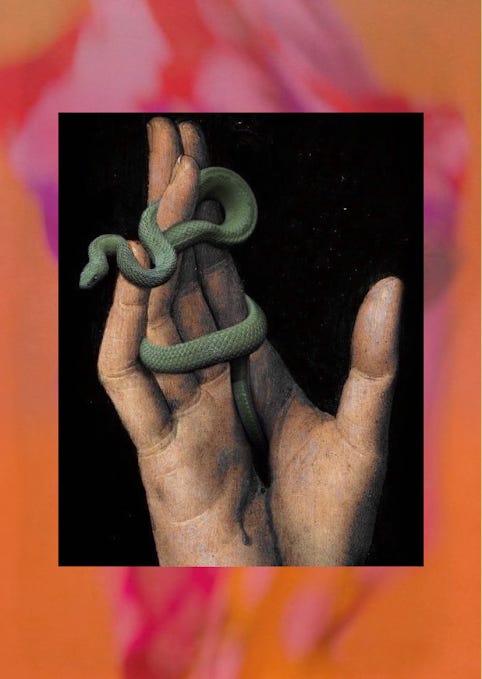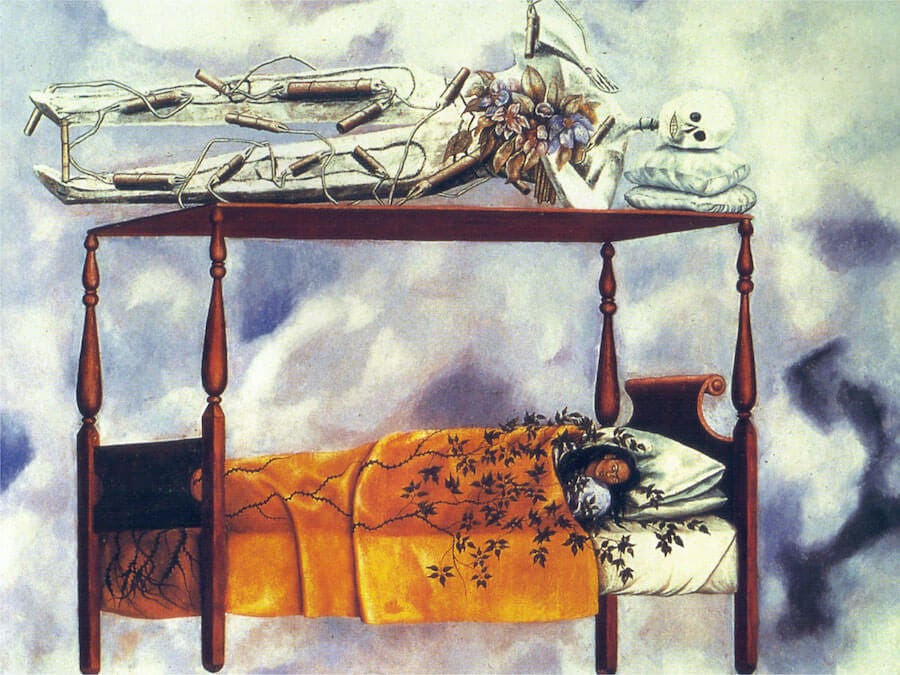Making Kin with Disability
Somehow, I managed to finish a book and submit it in the midst of physical meltdown. And now I’m puddle. Mostly bed bound. Bardo-brained. The other day, I went back to the outtakes from my book and read this one. It was a reminder I needed and today I offer it to you.
Making Kin with Disability
There is an indent at 11 o’clock on the ceiling. Like a child pressed a finger gently into cream. And to my right, in the distant corner a spiderweb disarticulates, abandoned by its mistress. Outside the sunshine is different than it was this time last week: thickened and blonde as a wheat field. This is the first insistent light of spring. Light so precise and potent that it can penetrate the soil to wake up crocus bulbs and frost-paused amphibians. A twang and curl in my stomach corresponds to this seasonal shift. The microbes in my gut have been dancing. They have been swaying and leaping and prancing in relationship to the immune cells currently heating up my intestines. Turning them into a party rather than a functioning digestive track. Yes, I can feel that these microbial and immunological rhythms do not care much about my sense of well-being. They see me as a landscape to rove through, not a sovereign king to blindly serve. But stranded in bed, I can at least be curious about what it might be like to be one of my besieged enterocyte cells in my intestinal epithelium or to be one of those tricky microbes shoved into the corner for so long, now allowed to blossom in the absence of a healthy microbiome. Do they know me better than I know me? Do they know my intimate geography with more nuance and attention than I will ever know? These bacteria understand my interior mountains and valleys, my secret creeks and geothermal vents, better than a lover ever would. Better than I ever will. I close my eyes, breathing through pain as the herniated discs in my neck wobble, and try to shrink myself “into” myself. I try to ride those microbes into their wild mischief. I try to understand my body by way of the beings that might easily be called its enemies or its disease.
Very often these days I am asked for exercises that will encourage greater ecological embodiment and connection. Very often these days I am invited into panels and conversations and events where ecological awareness and embodiment assumes an able body. A body that can move and travel and seek. We are encouraged to walk and find sit spots. To grow our own food. To put our bodies in “nature”. I’m guilty of this as well. When I am well enough, I love to walk and find it the easiest way to fall into step with the animals and fungi and plants around my home. But too often conversations about kinship and ecology leave behind those who might have the most to offer about how to engage with landscapes that are not always pure and able-bodied. In fact, most ecosystems these days share more kinship with disabled bodies given that they have been changed and interrupted by pollution and anthropogenic development. I have been offering more and more as someone with incurable genetic illness and PTSD, that it is to the neurodivergent, the chronically ill, the disabled, the terminally ill, the survivors who we must turn for information on how to come into relationship with beings and landscapes that are intimate with harm and impairment.
The Dream by Frida Kahlo
What if your “sit spot” wasn’t in a forest or meadow? What if it was in the wild, feral ruins of your own body? This is not conceptual to me. This is my lived, uncomfortable and simultaneously generative experience. Many days lately I have not been able to leave bed. Back in 2010 I barely left bed for an entire year, and was hardly able to even make it to the bathroom. I learned light that year. Second by second the slight gradations in color staining the wall opposite my bed. Anemic lavender in spring dusk. Dusty red sunsets in July. I learned about how the Valley around me inhaled and exhaled pollen-plush wind into my room on a scale much slower than my own agitated respiration. And I realized, then, that although I loved the wild, the streams, and the mountains, there was an ecosystem in my room. There was a whole world of species living and dying and disagreeing and dancing within my own flesh.
I learned that the microbes and fungal infections that my failing immune system invited inside were a part of my ecosystem. They lived in me just as I lived in the Hudson Valley. They walked my long pathways just as I had, for years, walked the long pathways outside the town of Woodstock.
Today I am not well enough to go to a sit spot. To visit my bird family and my river. But today I realize that kinship is not simple or external. It is contaminated and complex and interwoven into my very being. It is here to teach me I am not the main character of the story. I may not even be a character. I may be the setting. The landscape of microbial love stories.
As we seek to imagine ways to become ecologically embodied and environmentally aware, let us not forget to ask the bodies that know best what it is to be an ecosystem. The disabled and sick bodies that know best what it may feel like to be a polluted river, a clear-cut forest, a pesticide-addled population of honeybees.
(This thinking is very inspired by the work of Sunaura Taylor in relationship to disability theory and environmentalism)
This has been the free version of my newsletter. If you choose to support the paid version of this newsletter, you will receive at least two newsletters a month featuring everything from new essays, poetry, excerpts from my upcoming books and projects, mythic research, reading lists, poetry, book reviews to ecological embodiment exercises, playlists, personal updates, and generally a whole lot of funk and texture.
I am overwhelmed with gratitude by how many of you have showed up here to support my work and widen my thinking. As someone struggling to balance chronic illness (and just how expensive it is to be sick in America) with writing, know that you are very practically keeping me alive, keeping me afloat. Thank you deeply. I love you all so much.



"It is contaminated and complex and interwoven into my very being. It is here to teach me I am not the main character of the story. I may not even be a character. I may be the setting. The landscape of microbial love stories." Over and over, this is what you do that makes your writing and thinking so special. You turn the image on its head and show the writhing, living world underneath. It's really quite extraordinary and deeply necessary. Bardo-brained or not, your spirit and imagination seem a thousand times more vital than many able bodied folks trying to tread the same ground.
Sophie, this made my chest so full I couldn’t breathe and nearly brought me to ugly sobs. Thank you so much for this beautiful affirmation of self-as-ecology and for naming the ways that the mainstream reconnections to nature leave those of us who live in disabled bodies behind.